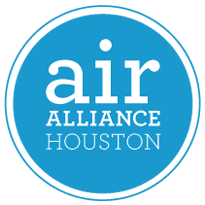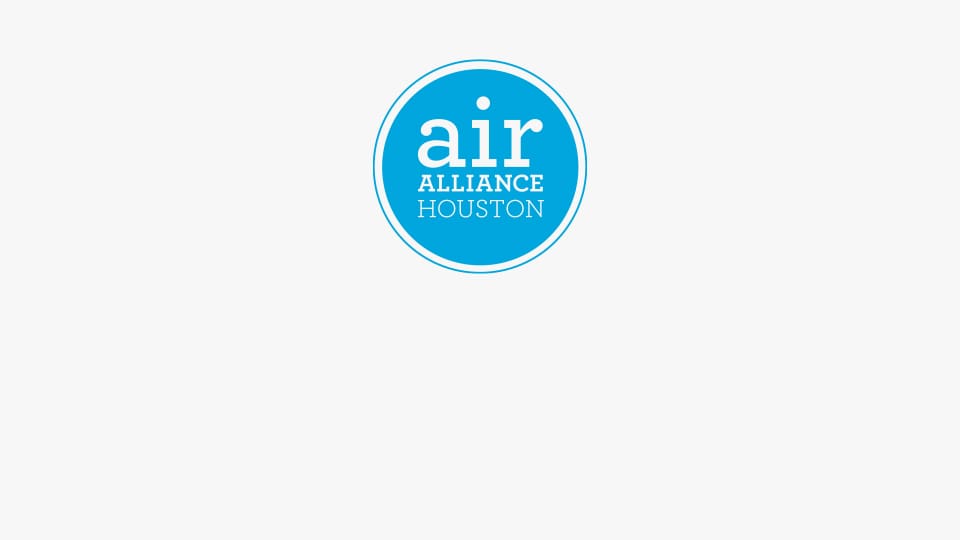Lone Star Legal Aid’s Environmental Justice Team recently talked with Executive Director of Air Alliance Houston, Bakeyah Nelson, PhD, to find out more about a Health Impact Assessment (HIA) being conducted by AAH this spring. Funded by the Urban Institute and the Robert Wood Johnson Foundation under the 500 Cities Data Challenge, the HIA will determine expected impacts of the I-45 N expansion plan, also known as the North Houston Highway Improvement Project (NHHIP), on community health, while also engaging with affected communities to suggest mitigation strategies for those impacts. LSLA EJ Managing Attorney Amy Dinn has been representing Independence Heights in the NHHIP’s public participation process.
Advocating for air quality and community health of Houstonians, Nelson recently returned from Washington, D.C. where she testified before Congress regarding EPA and TCEQ’s lagging enforcement of Texas air polluters, particularly egregious in the wake of Hurricane Harvey. We asked her about the NHHIP and the importance of community involvement to the HIA.
Q: We’d like to share more with our readers about what a Health Impact Assessment (HIA) is. Could you talk a little bit about the HIA process?
A: An HIA is an objective methodology to establish the ways in which a proposed policy or project could benefit and/or harm community health. Many types of data will be combined for the assessment. Air quality data were gathered with the help of Houston Advanced Research Center (HARC). We are also gathering health statistics, survey data, and multiple forms of qualitative data including information gathered during a stakeholder workshop; meetings with HISD and AISD school district leadership; and the upcoming community meetings, which will be held in March and April 2019.
Q: Four neighborhoods were chosen for the HIA community meetings (Third Ward, Fifth Ward, Greater Northside/Northline, and Aldine). What are some of the factors that went into deciding which communities to include?
A: The HIA focuses on nine different schools within these four neighborhoods. All of the schools are located within traffic-related air pollution (TRAP) zones (150 meters/500 feet) along the I-45 N corridor. In the Houston area, over 80,000 children attend schools within these TRAP zones. Children living or attending school near highly trafficked freeways like I-45 are at greater risk of damage to their developing brains, lungs, hearts, and circulatory systems. In addition to particulate pollution and ground-level ozone, a number of traffic-related air pollutants – such as diesel particulate matter, benzene, 1,3 butadiene, and formaldehyde – are known to cause cancer. The HIA will assess impacts of the NHHIP on communities who are already bearing a disproportionate burden of traffic-related pollution and who stand to be further impacted by this expansion. The recent study that reported Blacks and Hispanics breathe more pollution than they contribute re-emphasizes why this work is so critical. The primary schools being impacted are majority children of color and economically disadvantaged – children who have higher rates of asthma and whose families have fewer resources available to manage it. The expansion of the highway could potentially exacerbate these health issues.
Q: Why is community participation important to the success of the HIA? What would you like community members to understand about their role in the HIA process?
A: Two things I’d like to mention about this – the first being, it’s critical for community members to really let us know if our quantitative data aligns with their experiences. Quantitative data can only tell us so much – community feedback provides the context for those data. One example – recently during a meeting with the Aldine school district leadership, they mentioned traffic speed was a big issue, compromising safety of children and community members. Well, when we asked them, “What about the school zone?” they replied, “There is no school zone.” Only then did it become obvious how traffic speed was such a huge issue, something that otherwise would have been taken for granted. Now we can recommend adding school zones to that Aldine campus as one mitigation strategy.
The other piece is, it’s really critical for community members to voice their opinions to elected officials who are supposed to be representing the community’s interests. One of the things that will be provided during the community meetings is a detailed list of names and contact information for every elected official representing these communities. We’ll hand that out along with talking points, so that residents can contact their representatives if they want to. This provides another way of giving feedback to TxDOT on the NHHIP – a way for the community to express their concerns and needs.
Q: Is there anything else you’d like to share with our Lone Star Legal Aid readers about the NHHIP and HIA?
A: This project is massive, and it’s going to impact the entire region for the next 50 years or more. We see our current communities are living with the decisions of the past, where large infrastructure projects cut through communities of color and low-wealth, adversely impacting those neighborhoods both socially and economically as well as, compromising the health of residents. So if this project is not done thoughtfully and through an equity lens, it bears the potential to perpetuate some of those same issues. The HIA hopes to stop, or at least to minimize, this cycle of communities of color and low-wealth communities bearing the disproportionate burden of the negative impacts from these types of infrastructure projects.
Community Meetings on Children’s Health and the I-45 N expansion will be held:
- Tuesday, March 26, Bruce Elementary, 510 Jensen Drive, Houston, TX 77020, 4:00pm – 6:00pm
- Thursday, March 28, Jefferson Elementary, 5000 Sharman Street, Houston, TX 77009, 6:00pm – 7:00pm
- Monday, April 1, Aldine High School, 11101 Airline Dry, Houston, Texas 77037, 6pm – 7:30pm
- Tuesday, April 2, Emancipation Community Center, 3018 Emancipation Ave, Houston, TX 77004, 5:30pm – 7:00pm
For more information about community meetings and the HIA, contact Air Alliance Houston at: 713-528-3779 or info@airalliancehouston.org
This interview was originally published on the Lone Star Legal Aid’s blog.

